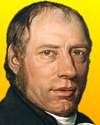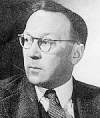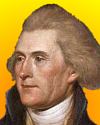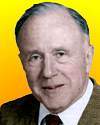|
|
|
LIMA, PERU—The remains of eight people estimated to be 800 years old were discovered by workers laying gas pipes near Lima, according to an ...
|
|
|

On 13 Apr 1771, Richard Trevithick was born, the English mechanical engineer and inventor who successfully harnessed high-pressure steam and constructed the world’s first steam railway locomotive (1803)
As a boy in Cornwall, he had no taste for school exercises. Much of his time was passed either in strolling over the mines amidst which he lived, or in working out schemes which had already begun to fill his youthful imagination. He was a pupil of Mr. Bull, an engineer practicing at that time in Cornwall. So it was that before he had reached the age of twenty-one, Trevithick was appointed engineer to several mines. Thus, the stage was set for an interest in the prospects of steam for locomotion, and the power of stationary engines.
To learn more of the background of this pioneer, and his accomplishments, read this chapter from Memoirs of the Distinguished Men Of Science of Great Britain: Living in the Years 1807-8 (1862). Be surprised how this life story of Trevithick includes llamas and monkeys.

On 13 Apr 1771, Richard Trevithick was born, the English inventor whose “Cornish engine,” was the world’s first self-propelled steam vehicle. In its design, he used the hot flue gasses to heat the water in the boiler, so improving efficiency. Sadly, lacking business acumen, he died in poverty. Today's book pick is: Richard Trevithick: Giant of Steam, by Anthony Burton, who will open your eyes to the unsung genius of this most remarkable contributor to the Industrial Revolution.
This is a well-researched book, which includes relevant quotes and comments. The story line is laid out like well-written novel is a page-turner.
It is available from Amazon, typically about New from $12.67. Used from $2.99. (As of earlier time of writing - subject to change.)
 | I have been branded with folly and madness for attempting what the world calls impossibilities, and even from the great engineer, the late James Watt, who said ... that I deserved hanging for bringing into use the high-pressure engine. This has so far been my reward from the public; but should this be all, I shall be satisfied by the great secret pleasure and laudable pride that I feel in my own breast from having been the instrument of bringing forward new principles and new arrangements of boundless value to my country, and however much I may be straitened in pecuniary circumstances, the great honour of being a useful subject can never be taken from me, which far exceeds riches. |
 | The three most effective incentives to human action may be … classified as creed, greed and dread. … In examining the scientist it is perhaps worth while to examine how far he is moved by these three incentives. I think that, rather peculiarly and rather exceptionally, he is very little moved by dread. … He is in fact essentially a person who has been taught he must be fearless in his dealing with facts. |
 | It is still an unending source of surprise for me to see how a few scribbles on a blackboard or on a sheet of paper could change the course of human affairs. |
| Before you look at today's web page, see if you can answer some of these questions about the events that happened on this day. Some of the names are very familiar. Others will likely stump you. Tickle your curiosity with these questions, then check your answers on today's web page. | |
| Births | |
 | Sir Robert Alexander Watson-Watt, born 13 Apr 1892, was a Scottish physicist whose invention of radar played a vital role in the defence of Britain again German air raids in World War II. The name “radar” comes from the beginning letters of four words that describe its function. What are these four words? |
 | A U.S. president, born 13 Apr 1743, had wide-ranging interests in science and invention. At his estate, he practiced scientific farming, always on the lookout for significant new plants. Among other activities, he collected fossils and funded scientific efforts. What is the name of this President? |
| Deaths | |
 | Annie Jump Cannon (1863-1941) was an American astronomer who specialized in the classification of stellar spectra at Harvard University. She reorganized the classification of stars in terms of surface temperature in spectral classes O, B, A, F, G, K, M. Her career was successful, despite a disability which struck her as a young adult. What was her disability? |
 | John Archibald Wheeler was the first American physicist involved in the theoretical development of the atomic bomb. He also originated a novel approach to the unified field theory. He recognized that any large collection of cold matter has no choice but to yield to the pull of gravity and undergo total collapse, What name did Wheeler give to the result of this total collapse? |
| Events | |
 | On 13 April 1869, the first U.S. patent for an air brake for railroad cars was issued to an inventor who went on to gain fame by establishing alternating current electricity distribution. What is the name of this inventor? |
 If you enjoy this newsletter, the website, or wish to offer encouragement or ideas, please send feedback by using your mail reader Reply button.
If you enjoy this newsletter, the website, or wish to offer encouragement or ideas, please send feedback by using your mail reader Reply button.
|